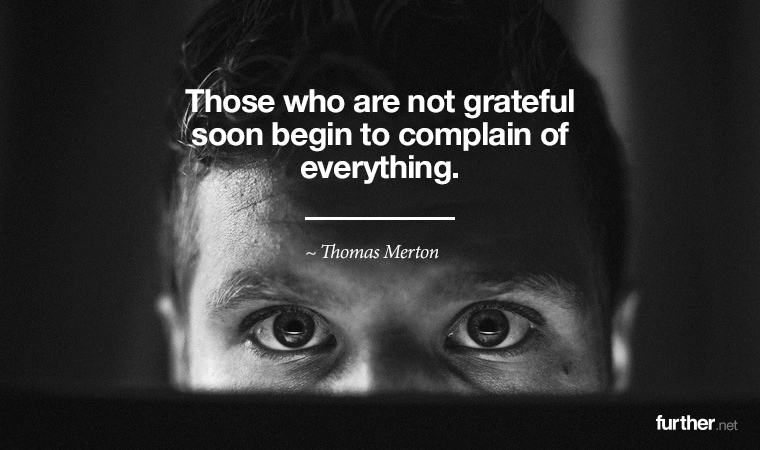
Thanksgiving is upon us in the U.S., and that means turkey, stuffing, football, and … oh yeah, gratitude. Funny how that seems to get lost a bit.
We know gratitude is good for us. And if the quote above from Thomas Merton is to be believed, a lack of gratitude leads to complaining, which can send us significantly in the other direction.
So, what about “thanks giving” could be possibly bad? Well, perhaps it’s the way many families choose to express (and enforce) it.
You know the drill … everyone around the table has to take a turn telling what they’re thankful for. Which is fine, unless you’re not really comfortable with that process.
- “According to research, feeling socially pressured to perform a certain happiness practice means it’s less fitting for us. Psychologists Sonja Lyubomirsky and Ken Sheldon suggest that the best happiness practices are ones we choose, not ones we feel forced into based on our circumstances.”
It comes down to two of the recurrent themes in Further … self-determinism and intrinsic motivation. We thrive when we’re doing things we truly want to do, for reasons that are inwardly our own.
If you’re the type who lives for being the gratitude ringleader at the turkey table, take heart. The article below has some excellent tips on how to make the process better for everyone involved.
Happy Thanksgiving!
The Trouble With Thanksgiving Gratitude
further: health
Would You Scarf 7 Big Macs?
Of course not, right? Well, that’s what the average American will consume in terms of calories this Thursday — a whopping 4,500 calories, to be precise. Maybe checking out the work you’re going to have to do afterwards will make you thankful for moderation. Or not.
How Much Exercise it Takes to Burn Off Thanksgiving Dinner Calories
Shock Therapy
Okay, the first article scared you away from a third piece of pie (you can thank me later). Here are actionable things you can do to mitigate the damage that does get done.
20 Ways to Stay Fit and Healthy This Thanksgiving
Unendurable
I got a lot out of this article, but make sure to read carefully. It’s not really about strength training versus cardio, but rather the folly of endurance training. I’ve become more and more convinced that my staunch refusal to run a marathon is actually motivated by sound principles of health, rather than the hellish thought of throwing up in one of those tiny cups of Gatorade.
A Case Against Cardio, Part 27
further: wealth
Interview with the Vampire
Whenever investor Peter Thiel interviews someone, he likes to ask the following question: “What important truth do very few people agree with you on?” Read on for why most answers are not that smart, and Thiel’s own answer to the question.
The Single Best Interview Question You Can Ask
How to Get More Money (Part One)
“It’s a great time to ask for a raise. But if you aren’t able to make a good case for yourself, then you might find that not only is your career becoming stagnant but also that you could be first on the chopping block in the event of corporate (or wider) economic misfortune.”
4 things to do before you ask for a raise
How to Get More Money (Part Two)
“On paper, the transition between freelancer and boutique creative studio can be just a single hire, or easier yet, just a shift in how you present yourself. Practically, making the leap from lone creative to full-fledged entrepreneur is much more complicated.”
The Second Leap: How to Go from Lone Freelancer to Full-Fledged Entrepreneur
further: wisdom
The Little Engine That Could
Uttering positive mantras to yourself, a la The Secret, doesn’t work if you don’t truly believe them, and can actually make you feel worse. A more promising approach is to engage in “self-affirmation” exercises, such as writing about the things you value (like your family or your career), and a new brain-imaging study shows why.
Brain Scans Can Help Explain Why Self-Affirmation Works
Guilty Knowledge
Guilt serves a powerful social function in terms of policing our behavior. But once you’ve realized you’ve done something wrong and vow not to do it again, why does the guilt persist? How do we go from having done a bad thing to feeling like a bad person, and more importantly, how do we stop it?
How To Stop Feeling Guilty, 5 Secrets Backed By Research
Story Time
Neuroscience tells us that what we truly are is a story of our self — a constructed narrative that our brain creates. If what you are is really a story, how you choose to interpret that story is always within your control. Best of all, your story can be changed.
Change Your Story to Change Your Life
__________
I’m out of here to go get my turkey on. If you’re celebrating Thanksgiving too, many blessings to you and yours. If you want to throw a blessing my way, sharing Further always works:
Keep going-
Brian Clark
Tour Guide
Further
